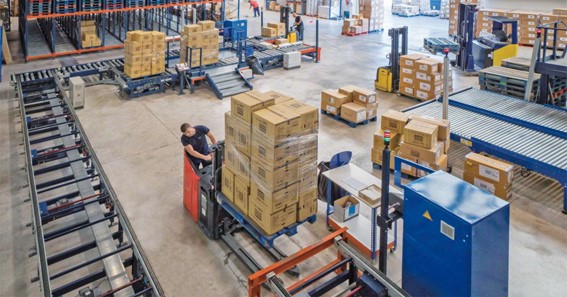Are you curious to know what is entrepot trade? You have come to the right place as I am going to tell you everything about entrepot trade in a very simple explanation. Without further discussion let’s begin to know what is entrepot trade?
In the intricate web of international trade, certain trading hubs hold a unique role that transcends mere transit points. Entrepot trade, an ancient yet enduring concept, refers to the business practice of importing goods into a country for the purpose of re-exporting them to other markets. These trade centers, often strategically located at crossroads of commerce, facilitate the flow of goods between different regions, acting as pivotal intermediaries in the global trade network. Join us as we delve into the world of entrepot trade, exploring its historical significance, characteristics, and its enduring impact on international commerce.
What Is Entrepot Trade?
The term “entrepot” is derived from the French word meaning “warehouse” or “depot.” Entrepot trade involves the importation of goods into a designated trading hub, where they are temporarily stored, processed, or re-packaged before being re-exported to other destinations. This trade model thrives on the principles of geographic advantage, efficient logistics, and trade facilitation.
Historical Significance
Entrepot trade has roots that stretch far back into history, dating to the ancient Silk Road and maritime trading routes. Historic trading cities like Venice, Constantinople, and Alexandria served as key entrepots, facilitating the exchange of goods between the East and West. These hubs not only fueled economic growth but also fostered cultural exchange and connectivity among diverse civilizations.
Characteristics Of Entrepot Trade
- Strategic Location: Entrepot trade centers are strategically positioned at crossroads of global trade routes, enabling efficient distribution of goods to various markets.
- Diverse Product Range: Entrepot trade involves a wide array of products, ranging from raw materials to manufactured goods. These hubs serve as melting pots of merchandise from different regions.
- Value Addition: Entrepots often engage in value-added activities such as repackaging, quality control, and processing, enhancing the appeal of products for subsequent export.
- Trade Facilitation: These trading hubs play a crucial role in easing customs procedures, reducing trade barriers, and ensuring smooth movement of goods.
Modern Relevance
In the contemporary world, entrepot trade continues to hold significance, albeit in evolved forms. Countries and regions that serve as entrepots, such as Singapore, Dubai, and Hong Kong, capitalize on their strategic location and infrastructure to facilitate international trade. These hubs act as gateways connecting various markets, contributing to economic growth and fostering globalization.
Benefits Of Entrepot Trade
- Enhanced Connectivity: Entrepot trade promotes interconnectivity among regions, facilitating cultural exchange and economic cooperation.
- Economic Growth: These trading hubs stimulate economic growth by creating employment opportunities and contributing to a vibrant trade ecosystem.
- Diversification: Entrepot trade allows countries to diversify their trade relationships and reduce dependence on a single market.
- Knowledge Transfer: As products flow through entrepots, knowledge about different markets, regulations, and consumer preferences is exchanged, enriching local business insights.
Conclusion
Entrepot trade is a testament to the enduring resilience of commerce across ages. As the world becomes increasingly interconnected, the role of entrepots as trade facilitators remains indispensable. By fostering efficient logistics, reducing trade barriers, and serving as vital nodes in the global trade network, these hubs continue to shape the trajectory of international commerce, contributing to economic prosperity and cultural exchange on a global scale.
FAQ
What Is Meant By Entrepot Trade?
Entrepot trade: It is basically a trade in which imported goods are re-exported with or without any additional processing or repackaging. Entrepotis mainly used to refer to duty-free ports with the high volume or re-export trade. At entrepot, goods do not face any import and export duties upon shipment from the port.
What Is An Entrepot Trade Class 11?
Entrepot trade refers to a type of trade where goods are imported from one country and re-exported to another country without undergoing any significant change in their form or quality. This trade is also known as re-export trade.
What Is Entrepot Trade Class 12?
An entrepot trade refers to the re-exporting of goods to another country, which were once imported, with or without processing or re-packaging them again by the exporter country.
What Is Entrepot Trade In One Sentence?
Entrepot trade means importing goods from one country and exporting the same to foreign countries. It is also known as ‘Re-export trade’.
I Have Covered All The Following Queries And Topics In The Above Article
What Is Entrepot Trade
What Is Entrepot Trade Class 11
What Is Meant By Entrepot Trade
What Is An Entrepot Trade
What Is The Meaning Of Entrepot Trade
What Is The Purpose Of Entrepot Trade
What Is Entrepot Trade With Example
What Is Entrepot Trade?
What Is An Entrepot Trade Answer In One Sentence
What Is Entrepot Trade Answer In One Sentence
What Is Entrepot Trade
What is an example of entrepot trade?
Is entrepot trade free from import duties?

